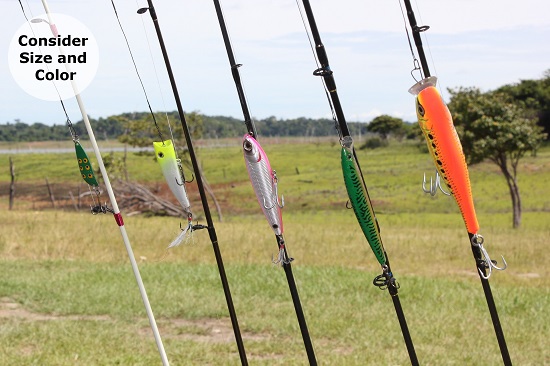Match the Hatch
Variety is definitely the spice of life when it comes to the world of bait. Visit any tackle store and you will quickly learn there are a multitude of sizes, colors, and types. Narrowing down the right bait for you does not need to be a daunting experience. Consider these tips the next time you visit your favorite tackle store and leave with the right bait.
1. Consider Size and Color
Identify the fish you are hoping to lure and match the bait to the fish’s prey. Bait that is too large can alarm the fish you are trying to catch and small bait can be overlooked. Mimic the color of the prey. Most things fish eat are going to have a natural color. Brightly colored bait can be good in some offshore applications, but if you are at the lake, you may want to choose a muted color.

2. Consider Location
Take the location of your favorite fishing hole into consideration when choosing the right bait. Freshwater fish are more likely to respond to artificial bait, while saltwater fish are more likely to hit a live bait. Depth is another factor, since the fish you are trying to lure will either be attracted to bait on top or underneath the surface.

3. Consider the Weather
Behavior of fish is dependent on weather patterns of the day. Fish have good senses about weather and react to pressure changes. The days leading up to a cold front is a good time to fish, since fish will be lethargic post cold front. Cold, cloudy days will change the light underneath the surface, so darker bait is ideal on overcast days. Warm, sunny days will yield clearer water, so if a cloudless sky is in the forecast, choose a lightly colored bait.

Consider the Season
Lucky for anglers, fishing is a year-round sport. Changing seasons will effect water temperatures, so make sure to adjust your bait accordingly. A moving bait can work in any temperature, but colder water will require a slower moving bait, like shaky heads. A faster moving bait, like crankbait, is appropriate for warmer waters. Faster baits are also great for spring spawning season. The fish are more aggressive during this time, so match bait to behavior.

There is no guarantee the fish will be biting. That is why they call it fishing not catching! However, following these tips can help you hone your craft while increasing the chances of hooking your best catch. Even the pros switch it up from time-to-time.












Comments
Please log into your account to post comments